 Petzlover
Petzlover American Foxhound is originated from United States but Kai Ken is originated from Japan. American Foxhound may grow 8 cm / 4 inches higher than Kai Ken. American Foxhound may weigh 10 kg / 23 pounds more than Kai Ken. American Foxhound may live 4 years less than Kai Ken. American Foxhound may have more litter size than Kai Ken. American Foxhound requires Low Maintenance. But Kai Ken requires Moderate Maintenance
American Foxhound is originated from United States but Kai Ken is originated from Japan. American Foxhound may grow 8 cm / 4 inches higher than Kai Ken. American Foxhound may weigh 10 kg / 23 pounds more than Kai Ken. American Foxhound may live 4 years less than Kai Ken. American Foxhound may have more litter size than Kai Ken. American Foxhound requires Low Maintenance. But Kai Ken requires Moderate Maintenance
 As a cousin of the English Foxhound, the American Foxhound is a scent hound and bred for hunting. Robert Brooke brought the first hunting dogs to the colonies in 1650. These dogs were the starting point for several American hound breeds including the American Foxhound.
As a cousin of the English Foxhound, the American Foxhound is a scent hound and bred for hunting. Robert Brooke brought the first hunting dogs to the colonies in 1650. These dogs were the starting point for several American hound breeds including the American Foxhound.
For almost 300 years the Brooke family owned and bred dogs from this bloodline.
At the same time that Brooke was hunting with and breeding his hounds, George Washington was given French Foxhounds. These were crossed with the Brooke’s dogs to create the American Foxhound. This breed is said to have been originally bred in Virginia and Maryland.
They are the state dog of Virginia. After Red Foxes were imported or migrated, Irish Foxhounds were brought to American and added into the line, increasing the stamina and speed that today’s dog’s still display.
The American Foxhound was recognized by the American Kennel Club in 1886. Today’s American Foxhound presents in many different lines but are all considered the same breed even though some ay look very different. These strains include the Trigg, Walker, Penn-Marydel, Goodman, July and Calhoun.
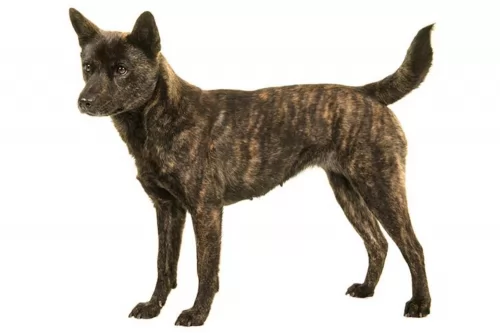 The Kai Ken dog hails from Japan and is both an ancient and rare dog. In fact the dog was discovered in 1929 in the Kai province near Mount Fuji. The dog has the nickname Tora Inu in Japan which means 'Tiger Dog'. Maybe its got to do with the brindle striped coat or his bravery.
The Kai Ken dog hails from Japan and is both an ancient and rare dog. In fact the dog was discovered in 1929 in the Kai province near Mount Fuji. The dog has the nickname Tora Inu in Japan which means 'Tiger Dog'. Maybe its got to do with the brindle striped coat or his bravery.
He falls into the working class category. In 1931, the Kai Ken Aigokai registry was formed to preserve the dog. In fact in this year Dasuke Adachi discovered these dogs and in 1934 was actually designated a Natural Monument in Japan and also protected by law.
The Kai Ken was recognized in 1934 by the Japanese Kennel Club. It is not 100% certain but it is thought that the dog was brought to the United States in the 1950s.
 Given the variety of bloodlines and strains mentioned above, there can be many differences in the American Foxhounds. Because of this most American Foxhounds bred to show are Walkers as they most closely fit the AKC Breed Standard.
Given the variety of bloodlines and strains mentioned above, there can be many differences in the American Foxhounds. Because of this most American Foxhounds bred to show are Walkers as they most closely fit the AKC Breed Standard.
In general, the American Foxhound has long, straight legs and is taller than the English Foxhound. They have a narrow chest and domed skull with a long muzzle.
They have low, wide set eyes that should be dark – brown or hazel, never blue. They have feet like a fox and laid-back shoulders with a curved tail. Athletic and muscled, the American Foxhound is bred to run. They are one of the rarest breeds in the United States.
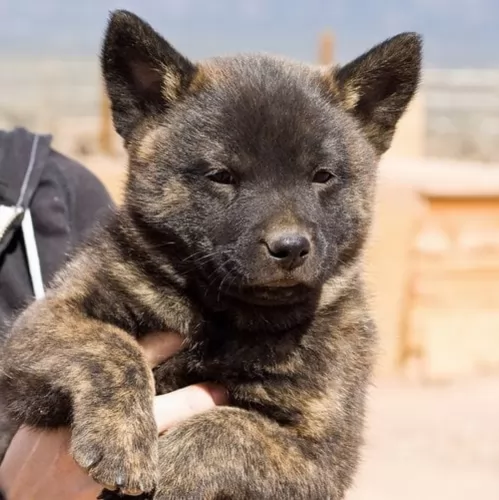 The Kai Ken has always been used for hunting purposes. He comes as recommended for hunting people and those who are active.
The Kai Ken has always been used for hunting purposes. He comes as recommended for hunting people and those who are active.
It is a medium sized dog standing at between 43 to 56cm in height both male and female and weighing between 14 and 22kg.
The ears of the dog are erect, the muzzle is fairly tapered and the nose is black. The tail is bushy like that of a fox and curls over the back. The double coat of the dog is of medium length and harsh and is a brindle color in a reddish or black shade.
Puppies are born black and then the brindle stripe-like pattern comes in later. He has an athletic body and is a keen swimmer.
The Kai Ken is an intelligent dog, loyal to his human family while being somewhat reserved around strangers. They are amicable with both children in the home as well as other pets.
He is a friendly, intelligent dog, forming close bonds with his family. Have him trained and socialized and he'll make you a splendid pet who will be willing to guard you if anyone threatens.
One look at that bright face and you can see that he is an intelligent, independent dog. He is also courageous and fearless and makes a great watchdog, especially because he is naturally reserved and suspicious with strangers.
 With a reputation as a docile, sweet dog, the American Foxhound is great with kids and animals. They are gentle and often very shy with strangers. They are strong willed and stubborn especially when training them, so they are not a good first dog. They need an owner who has handled dogs before and knows how to be the pack leader without being angry or mean.
With a reputation as a docile, sweet dog, the American Foxhound is great with kids and animals. They are gentle and often very shy with strangers. They are strong willed and stubborn especially when training them, so they are not a good first dog. They need an owner who has handled dogs before and knows how to be the pack leader without being angry or mean.
The American Foxhound is a scent hound and once he is on the scent it is close to impossible to distract him from it. They have a tendency to ignore commands when they are in this state. A strong owner/leader is needed for this reason. Don’t let him off leash in an unfenced area.
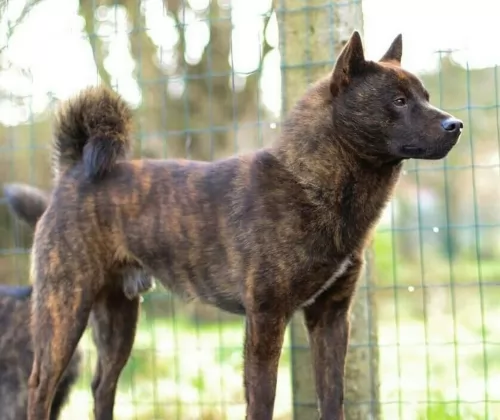 The Kai Ken is a working- and hunting dog, so he is used to being active and will want a home where he can be played with and exercised regularly.
The Kai Ken is a working- and hunting dog, so he is used to being active and will want a home where he can be played with and exercised regularly.
He can be slightly stubborn and independent so training and socialization are imperative. This is also because the dog’s curiosity and his athletic skills can lead to trouble if he isn’t properly trained.
Treat him the way he deserves and you’ll see that he is able to develop a strong bond with you and be altogether an excellent family pet.
 The American Foxhound, like most hunting dogs does not carry a lot of genetic disorders. But they can easily become overweight and this can cause major problems. Dysplasia of any type had been mostly unknown in this breed, but due to obesity it is cropping up on occasion. Breeders have not, and do not usually screed for any genetic diseases.
The American Foxhound, like most hunting dogs does not carry a lot of genetic disorders. But they can easily become overweight and this can cause major problems. Dysplasia of any type had been mostly unknown in this breed, but due to obesity it is cropping up on occasion. Breeders have not, and do not usually screed for any genetic diseases.
The most devastating health issue the American Foxhound faces is thrombocytopathy. We will go into more detail on this in the Care for Pet section. This is a disease of the blood system, namely the platelets.
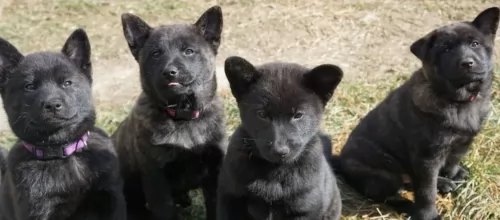 With a lifespan of 14 to 16 years, and given the genetic purity of the Kai Ken, you aren't likely to battle with congenital health problems with your dog, but it is always good to be aware of certain minor health issues that he could succumb to.
With a lifespan of 14 to 16 years, and given the genetic purity of the Kai Ken, you aren't likely to battle with congenital health problems with your dog, but it is always good to be aware of certain minor health issues that he could succumb to.
He can suffer from a few common dog diseases such as progressive retinal atrophy or hip dysplasia.
This is a disease of the eye where there is wasting of certain parts, and in this case the cells of the retina develop abnormally. This can eventually lead to blindness. It’s an inherited disease that can occur in pure- and mixed breeds, and dogs with PRA shouldn’t be used for breeding.
It isn’t a painful condition, and the first symptom usually noticed in a dog is night blindness where you may notice him bumping into things at night and being reluctant to walk around in the dark.
 Whether feeding a pup, or an adult American Foxhound, you need to be sure the food is high quality and that you don’t overfeed. The Foxhound is happy to eat as much as you give him. They like to eat. Make sure you measure and don’t free feed. Control what they are eating.
Whether feeding a pup, or an adult American Foxhound, you need to be sure the food is high quality and that you don’t overfeed. The Foxhound is happy to eat as much as you give him. They like to eat. Make sure you measure and don’t free feed. Control what they are eating.
For a puppy feed twice, a day – 2 to 3 cups of high quality puppy food. When he becomes an adult feed him once a day with 2 cups of adult food.
As mentioned previously, the American English Foxhound, like most of the hound breeds is a very healthy dog. They do not have many genetic health issues. They do have a risk for thrombocytopathy. This risk is slight, but all owners of American English Foxhounds should be aware of it.
This disease is a circulatory system disease with poorly or non-functioning platelets. Platelets are designed to assist in the control of bleeding and without functioning ones the dog can bleed excessively from just a minor cut or bleed internally from a minor injury. The disease can be treated but you have to notice it first. Depending on how severe the disease is, the treatment will vary. Some dogs will have to be given platelets.
This is a high energy breed that is very active and needs a lot of exercise. They are not good for the first-time owner as they are stubborn and hard to train. They need room to run and get frustrated and out of sorts if they don’t have it. They can live in the suburbs but only with a large fenced yard, an even larger dog park and regular walks. This dog needs a lot of exercise. The simplest thing to do is take him hunting.
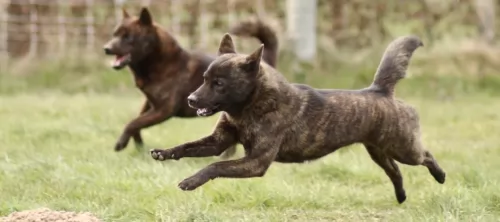 Even though the coat is thick, the Kai Ken will require basic canine care, so a brush twice a week will be enough to keep the coat free of loose hair. He sheds more heavily a couple of times a year and then he will require more brushing.
Even though the coat is thick, the Kai Ken will require basic canine care, so a brush twice a week will be enough to keep the coat free of loose hair. He sheds more heavily a couple of times a year and then he will require more brushing.
He has always been used to hunt so he is a dog that will require regular exercise such as walks, hikes, swimming and ball games.
The nails of the dog should be trimmed regularly once they become long as long nails can be hazardous and can hook onto things, causing injury to the nail area.
The ears of the dog should be checked regularly for fleas and ticks, and teeth should also be brushed with canine toothbrush and toothpaste.